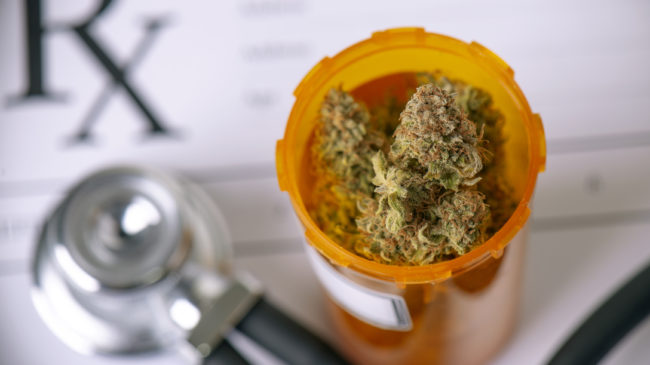Mississippi Initiative 65 and Alternative 65A: Medical Marijuana Amendment
Summary:
Initiative 65 and Alternative 65A would amend the state constitution to permit medical cannabis in the state.
Voters will be asked two questions on the ballot about these amendments:
First, they will be asked if they want “either measure”—meaning they want to allow medical cannabis in Mississippi, or if they want “neither measure”—meaning they do not want to allow medical cannabis in Mississippi.
Second, they will be asked to pick either Initiative 65 or Alternative 65A, regardless of what they answered to the first question above. Those who say “either measure” must pick one of the two in this second question. Those who choose “neither measure” may pick one of the amendments in this second question or may choose not to—so if “either” wins over “neither” those voting neither at least get to help decide which of the two initiatives prevails.
Initiative 65, a citizen-submitted initiative, would authorize qualified patients with debilitating medical conditions as certified by Mississippi licensed physicians to use medical cannabis from licensed treatment centers regulated by the State Department of Health.
Alternative 65A, the legislature’s alternative measure, would institute a more limited medical cannabis program and does not include details such as which medical conditions are eligible, when the program would start, tax rates, etc. instead of leaving those to the legislature to put in place if the measure passes.
Fiscal Impact
There are no official estimates but based on typical Mississippi states taxes and fees either of these two measures would likely generate several million dollars in new state revenue.
Proponents Arguments in For Initiative 65
Proponents of Initiative 65 argue that medical marijuana is a safe and effective treatment option for a broad range of serious medical conditions and their symptoms, such as chronic pain. More than 3.5 million Americans are using medical marijuana in 34 states, and supporters say that there is no reason to deny the same options for Mississippians who are in chronic pain or suffer from other symptoms from debilitating medical conditions. They say that Initiative 65 gets a medical marijuana program up and running as soon as voters approve it, while Alternative 65A means politicians will have to decide when and how a medical marijuana system will begin. Because the legislature has blocked every medical marijuana bill in the past, that could never happen.
Supporters also argue that Initiative 65 requires the Department of Health to develop and enforce regulations on the medical marijuana system and has strict timelines for doing so. Doctors will be allowed, but not required, to certify medical cannabis for specified ailments under Initiative 65, while Alternative 65A leaves that up to politicians.
Opponents Arguments Against Initiative 65
The Mississippi State Department of Health opposes Initiative 65 and has stated that medical cannabis “is not FDA approved, it is illegal, and has not undergone a rigorous medical review.” The Mississippi State Board of Health also argues that Initiative 65 gives physicians too much leeway in prescribing medical marijuana, that people might not use it as prescribed, and the FDA has not defined or approved medical marijuana. Other opponents have said that Initiative 65 would lead to “pot shops” near schools and churches, would make it easier for drug abusers to get marijuana, and would overburden law enforcement.
Proponents Arguments for Alternative 65A
Proponents of Alternative 65A say it will give those who need medical marijuana for a terminal illness a responsible pathway to access it. They argue that Initiative 65 is too broad and will lead to the state having more recreational marijuana, while Alternative 65A will place more restrictions on marijuana use. Alternative 65A will give the legislature the ability to regulate medical marijuana and will specifically allow for local regulations on where marijuana shops are located, while Initiative 65 will not.
Opponents Arguments Against Alternative 65A
Opponents of Alternative 65A say that it was put on the ballot by the legislature to confuse voters and split the vote so that neither measure receives the required amount of votes to pass, and ultimately prevent approval of medical marijuana for patients in Mississippi. The legislature failed to act on more than 20 proposed bills in recent years designed to create a legislatively established medical marijuana program and only acted when the citizens demanded action by putting their own initiative on the ballot. Opponents further say that Alternative 65A is the legislature trying to claw back power from citizens. While Initiative 65 establishes a fully viable medical marijuana system that learns from what has worked and not worked in other states, Alternative 65A does not include most of the basic components necessary.
Discussion
The first thing Mississippi voters must decide is how they feel about medical marijuana. Nationwide, Pew Research Center finds 92 percent of Americans support legalizing it, including 88 percent of those who are Republican or lean Republican. A recent poll in Mississippi shows that 81 percent favor “allowing patients with medical conditions and serious illnesses to possess and consume marijuana if their doctors recommend it,” breaking down to support from 89 percent of Democrats, 76 percent of Republicans and 82 percent of independents.
This growing support for making medical marijuana accessible and regulated, as explained by Republicans Against Marijuana Prohibition, is fueled by a growing recognition of its medical potential, the vast number of undeniable stories of breakthroughs in relief for children, veterans and others suffering from debilitation maladies, and the belief that doctors and patients alone should be the ones deciding which treatments make sense. Conservatives in Mississippi have argued along similar lines, pointing out that doctors are licensed and heavily regulated by the state and are capable of evaluating the merits of medical marijuana. With the government already regulating healthcare at an unprecedented level, vastly growing state power, conservatives who value federalism and the rights of patients and doctors should support medical marijuana.
Given that doctors and patients already make decisions about prescribing drugs that, if abused, are vastly more harmful than marijuana, it seems odd to think that this relatively mild medicine (that there are no reported deaths from) can’t be trusted to doctors, while opioids, tranquilizers, stimulants and other potentially deadly drugs are prescribed every day.
The second choice that voters face is between Initiative 65 and Alternative 65A, and the differences between them are significant:
| Provision | Initiative 65 | Alternative 65A |
| Number of qualifying conditions | 22 specified; more may be established at a later date | none specified |
| Possession limits | 2.5 ounces at once | none specified |
| Ability to smoke marijuana | prohibited in public places | restricted to terminally ill patients |
| Taxes on marijuana sales | taxed at state sales tax rate (7% as of 2020) | no tax rate specified |
| Cost for medical marijuana patient ID cards | capped at $50 | no cost specified |
| Administrating agency | Mississippi Department of Health | not specified |
| Deadline for finalized regulations | July 2021 | not specified |
| Deadline for medical marijuana cards to be issued | August 15, 2021 | no date specified |
Source: Ballotpedia.
Initiative 65 specifically defines debilitating medical conditions eligible for treatment with medical cannabis (see table below). If you know someone with any of these diseases, you know how hard it can be to find an effective treatment. This list was built from experience by doctors and patients in other states successfully treating using medical marijuana. Indeed, this standard list is used in several other medical cannabis states and is included to prevent politicians from being the ones to decide which diseases can be treated with marijuana as a medicine, and instead leave it up to doctors and patients.
| Cancer | Amyotrophic lateral sclerosis |
| Epilepsy or other seizures | Crohn’s disease |
| Parkinson’s disease | Agitation of dementias |
| Huntington’s disease | Ulcerative colitis |
| Muscular dystrophy | sickle-cell anemia |
| Multiple sclerosis | Autism with aggressive or self-injurious behaviors |
| Cachexia | Pain refractory to appropriate opioid management |
| Post-traumatic stress disorder | Spinal cord disease or severe injury |
| Positive status for human immunodeficiency virus | Intractable nausea |
| Acquired immune deficiency syndrome | Severe muscle spasticity |
| Chronic or debilitating pain | |
| Or another medical condition of the same kind or class to those herein enumerated and for which a physician believes the benefits of using medical marijuana would reasonably outweigh potential health risks | |
Initiative 65 allows qualified patients to possess not more than 2.5 ounces of medical cannabis at one time and that no more than 2.5 ounces may be provided to a patient in any 14-day period. (Excluding ingredients in edible products, topical products, ointments, oils, tinctures, etc.) The initiative also prohibits a medical cannabis treatment center from being located within 500 feet of a school, church, or child-care establishment. It also states that nothing in the measure’s text would affirmatively require a physician to issue a certification for a patient to obtain medical cannabis, so only doctors willing to recommend medical cannabis will do so.
Alternative 65A is shorter in length than Initiative 65 and leaves many details about how medical marijuana would work in Mississippi for the legislature to figure out later. But at the same time, it does clearly aim for a stricter and more limited medical cannabis program and contains some problematic provisions. For example, it mandates that legal marijuana products “shall be of suitable pharmaceutical quality,” but does not define what that means. No other state has imposed such a requirement, and since pharmaceutical-grade standards are prescribed by the U.S. Food and Drug Administration which has declined to issue such standards for cannabis, there is no such standard.
Alternative 65A also requires that treatment “shall be carried out by physicians, nurses and pharmacists,” which seems to mean either that one of those medical professionals must administer every dose a patient takes that patients would need approval from all three to receive medical marijuana since elsewhere the measure says only doctors may prescribe it. Again, no other state has such a requirement.
Alternative 65A also requires a state registry of enrolled patients, a process for patient tracking, and assessment of treatment outcomes. It also bans smoking as a means of administering medical marijuana except by those with terminal medical conditions.
Voters’ Guide to Other Marijuana Legalization and Drug Policy 2020 Ballot Initiatives
Voters’ Guides to 2020 Ballot Initiatives on Other Policy Topics

